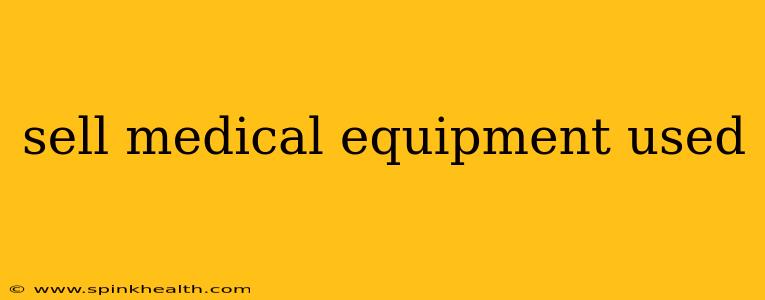Selling Used Medical Equipment: A Guide to Navigating the Market
The world of medical equipment is a complex one, filled with stringent regulations and specialized knowledge. Selling used medical equipment, therefore, requires a careful and strategic approach. This isn't just about flipping items; it's about ensuring the safety and efficacy of the equipment while navigating a potentially lucrative market. This guide will help you understand the process and avoid common pitfalls.
My name is Alex, and I've spent the last decade working in medical equipment sales and refurbishment. I've seen the best and worst of this business, and I'm excited to share my insights with you. Let's dive in!
What types of used medical equipment are in demand?
The demand for used medical equipment varies greatly depending on factors like technological advancements, budget constraints of healthcare facilities, and overall market trends. Generally, equipment that's still functional and in good condition, yet no longer the latest model, holds significant value. Popular items include:
- Diagnostic imaging equipment: Ultrasound machines, X-ray systems (though these often require more stringent regulations), and older MRI units.
- Surgical instruments: Laparoscopic instruments, surgical lasers (again, with careful consideration for safety and maintenance records), and basic surgical tools remain in demand.
- Patient monitoring equipment: ECG machines, pulse oximeters, and vital signs monitors, especially older models that might still be reliable in certain settings.
- Physiotherapy equipment: Treadmills, exercise bikes, and other rehab equipment.
However, newer technology often makes older models obsolete. Understanding the current market trends is crucial.
How do I determine the value of my used medical equipment?
Pricing used medical equipment is a delicate balance. Several factors come into play:
- Age and condition: A well-maintained, newer model will command a higher price than an older, worn-out unit. Detailed photos and a comprehensive description of the equipment's condition are essential.
- Maintenance records: Complete service history significantly boosts value and assures buyers of the equipment's reliability. Missing records can drastically reduce its worth.
- Market research: Look at comparable listings on online marketplaces to get an idea of prevailing prices. Don't just look at the asking price; consider the sold prices to get a realistic estimate.
- Features and specifications: The more advanced the equipment, the higher its value.
It's wise to consult with an appraiser specializing in medical equipment to get an accurate valuation.
What are the legal and regulatory considerations for selling used medical equipment?
This is arguably the most critical aspect. Selling used medical equipment often involves strict regulations to ensure patient safety:
- Compliance with FDA regulations: Depending on the type of equipment and its intended use, you might need to comply with specific FDA guidelines.
- Proper documentation: Maintain thorough records of the equipment's history, including maintenance, repairs, and any reported malfunctions.
- Cleaning and sterilization: The equipment must be thoroughly cleaned and sterilized before sale to meet infection control standards.
- Clear labeling: Label the equipment accurately and clearly to avoid any confusion or misidentification.
Ignoring these regulations can lead to significant legal and financial consequences.
Where can I sell my used medical equipment?
Several avenues exist for selling your used medical equipment:
- Online marketplaces: Websites dedicated to medical equipment sales, such as online auction sites, provide a broad reach to potential buyers.
- Direct sales to healthcare facilities: Contacting hospitals, clinics, and private practices directly can lead to quicker sales, though it requires more networking and relationship building.
- Medical equipment brokers: Brokers act as intermediaries, connecting sellers with buyers and often handling the sales process. They might charge a commission, but they can save you time and effort.
- Auctions: Public auctions, especially those specializing in medical equipment, can attract competitive bidding and potentially higher prices.
Selling used medical equipment demands careful consideration of many factors. By understanding the market, adhering to regulations, and presenting your equipment accurately, you can successfully navigate this specialized market. Remember that prioritizing safety and transparency builds trust with buyers and contributes to a smoother and more profitable transaction.

